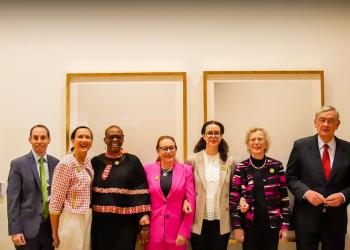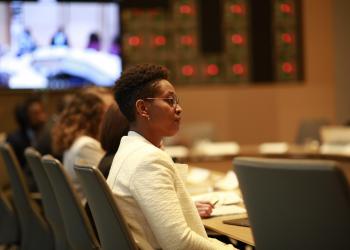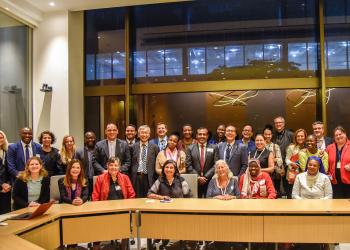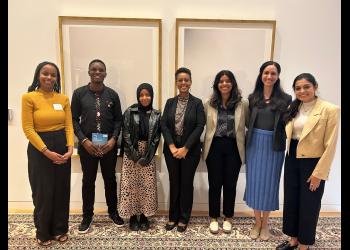Baha’i UN representatives at UNGA see consensus on Sustainable Development Goals—with progress needed on bridging gap between words and deeds
The United Nations General Assembly (UNGA) High-Level week concluded last week in New York – with representatives of the Baha’i International Community (BIC) participating across the week and reflecting on what the proceedings suggest for humanity in the coming months and years.
“Listening to the various interventions from leaders around the world, it’s clear that there is widespread consensus around the aspirations outlined in the Sustainable Development Goals. Equally clear is the consensus around how much more distance we have to traverse to meet these goals,” said Bani Dugal, Principal Representative of the BIC.
“What seems to be in short supply is a common understanding around what it will take to tap into the deeper stores of motivation necessary to bridge the gap between words and deeds,” she added.
Dugal spoke at a variety of events during UNGA, including the World Economic Forum’s Sustainable Development Impact Forum (see recording); a half-day event hosted by the Trilateral Partnerships of Regional Faith-Based Networks for the SDGs, titled Inspiring Faith, Hope and Transformative Action to Accelerate Progress towards the SDGs (see recording), which included Rashad Hussain, US Ambassador-at-Large for International Religious Freedom; and an event titled Innovative Intra- and Inter-faith Peacebuilding: Pursuing Freedom of Religion or Belief for the realization of the SDG 2030 Agenda and beyond, cosponsored by UNDP, the Network of Religious and Traditional Peacemakers, and the BIC itself.
The BIC offices co-hosted a number of high-level events on various themes over UNGA week. These included a three-part series organized by the Global Governance Forum on A Second Charter: Imagining a Renewed United Nations (see session summaries); a meeting of the Club de Madrid, including a number of former presidents and prime ministers (see BIC remarks delivered at this gathering); the Climate Governance Commission’s event, Governing our Planetary Emergency, featuring Mary Robinson, former president of Ireland, Danilo Turk, former president of Slovenia and current president of the Club de Madrid, and Maria Fernanda Espinosa, former president of the UN General Assembly; and an event on Trust and Accountability: Bringing Values into our Future (see recording), organized by the International Environmental Forum.
“The assumptions underlying the United Nations as it exists today are no longer suited to the needs of humanity. Therefore, we need to be thinking creatively about how the UN can evolve, and asking fundamental questions about the arrangement of the international order,” said BIC Representative Daniel Perell, who spoke at a number of the events taking place in the BIC offices (see short interview).
“The longer we delay this necessary conversation, the greater the risk humanity faces. Thankfully, the upcoming Summit of the Future called for by the Secretary-General in 2024 offers a key opportunity to confront this challenge,” Perell added, referring to next year’s high-level event intended to bring world leaders together to “forge a new international consensus on how we deliver a better present and safeguard the future,” according to the initiative’s website.
BIC Representative Liliane Nkunzimana (see short interview) participated in UNGA events centered on youth as well peace and security issues. This included delivering remarks at the intergenerational leadership Goalscorers Summit, hosting a meeting with African UN Youth Delegates (AUNYD) to discuss the importance of preparing young people to participate effectively in multilateral spaces, and contributing to a variety of events focused on SDG 16, the New Agenda for Peace, and the Women, Peace and Security Agenda.
“Change will come not just from our leaders today but also from the leaders of tomorrow,” said Nkunzimana, who has spent the past year in conversations with young people active in international civil society, an area of particular interest as the UN has been establishing its groundbreaking Youth Office.
“We hope that there will now be a positive evolution in the way that youth are included in UN processes—from the General Assembly to every deliberative forum and international mechanism. But inclusion and engagement are just the start.”
BIC Representative Saphira Rameshfar (see short interview) followed events related to the UN’s gender review, the Women’s Major Group, and other initiatives assessing how the international community is progressing with Sustainable Development Goal #5 on gender equality.
“One point of agreement in the international community today seems to be that the system we have—the multilateral order, the arrangements of the United Nations system, and the norms that govern our international dealings—is not achieving the ends that we seek,” said Rameshfar. “We need creative and new solutions to our problems. Compromise and consensus may be the beginnings of this path.”
Key themes the representatives identified across a range of UNGA deliberations included the need for consensus around challenges to be matched by agreement on actions and priorities; the need for greater trustworthiness on the part of international actors, as a precursor to greater trust within the multilateral system; and the need to situate responses to short-term national challenges within the long-term interests of all humanity.







